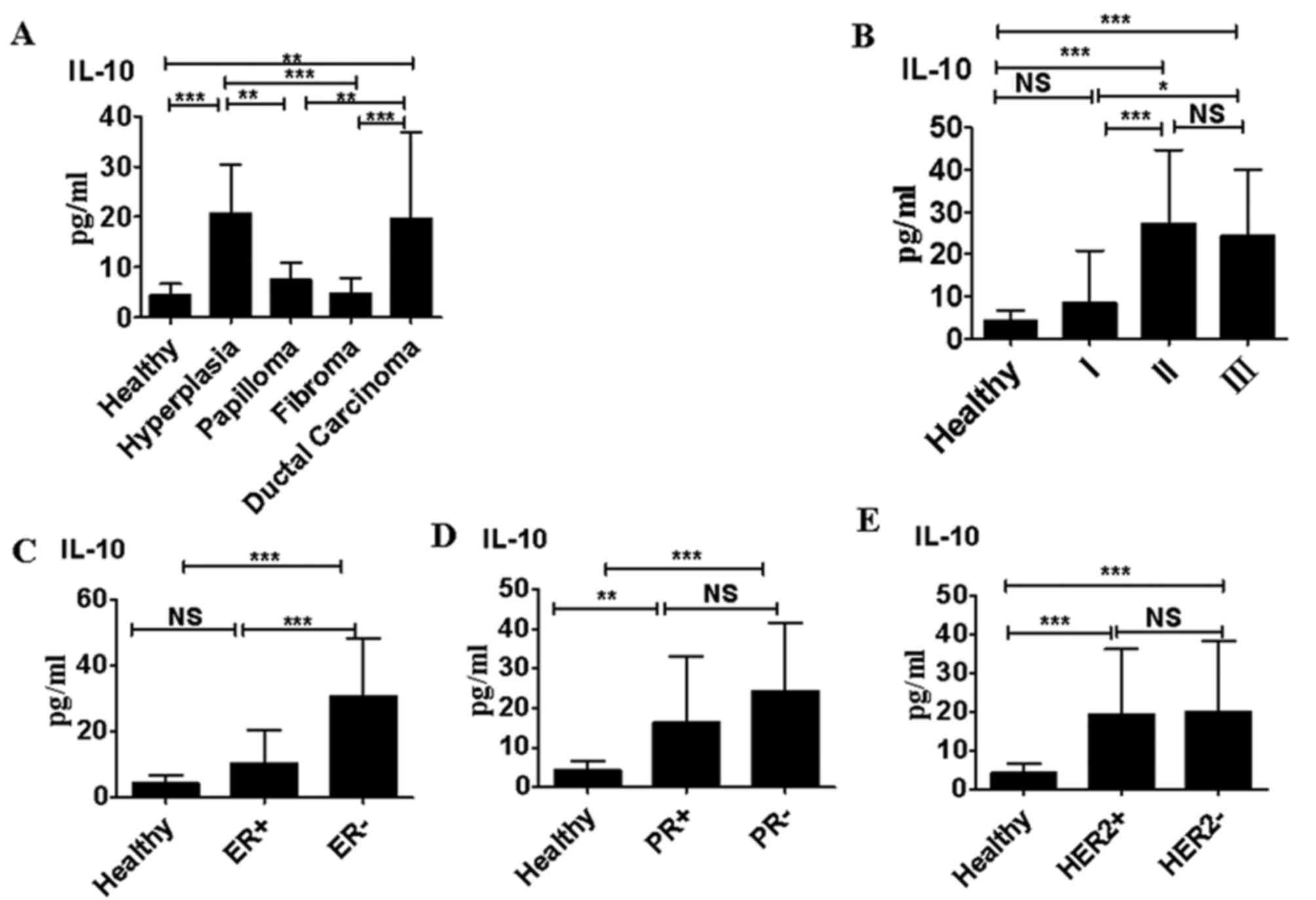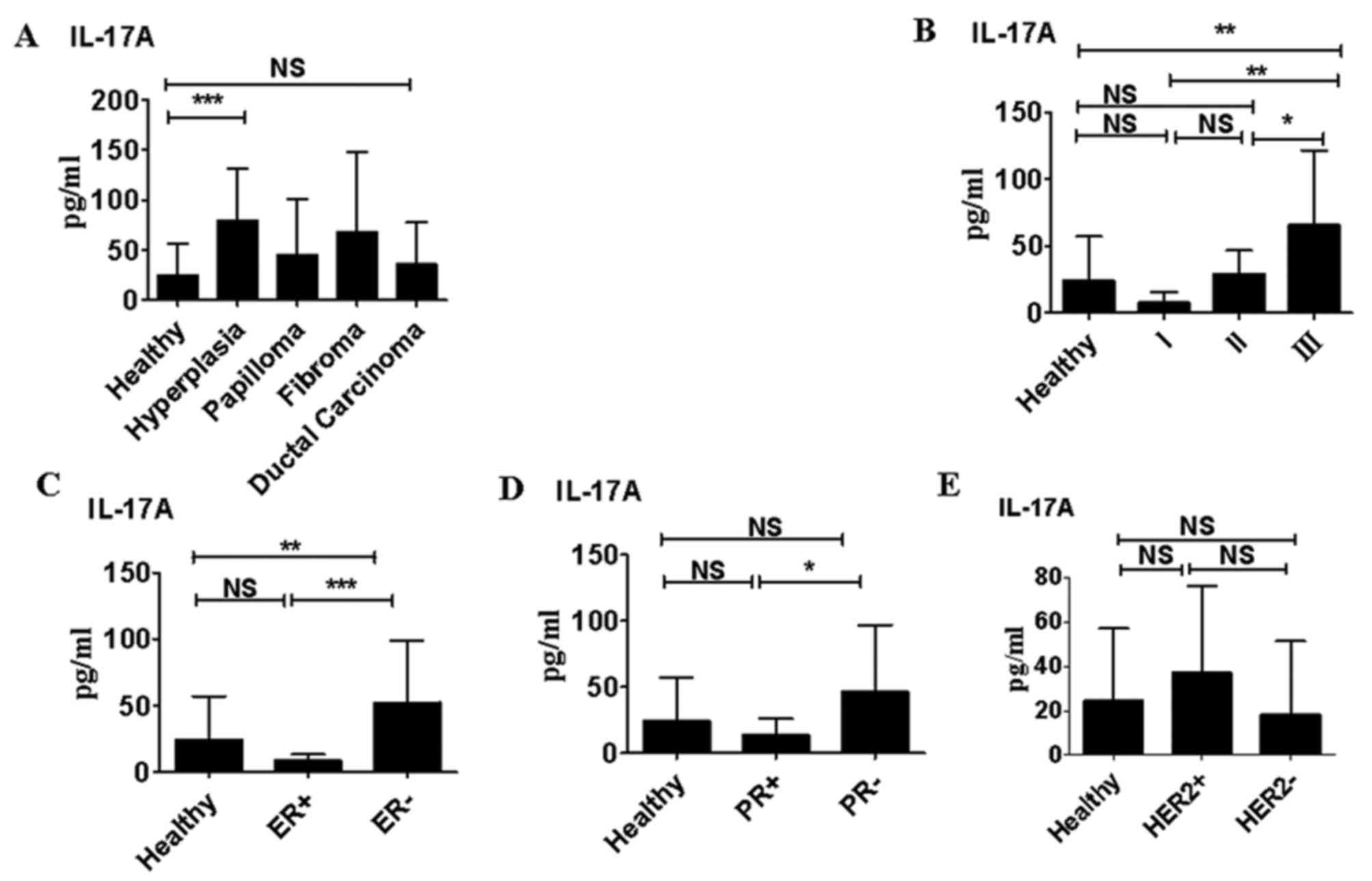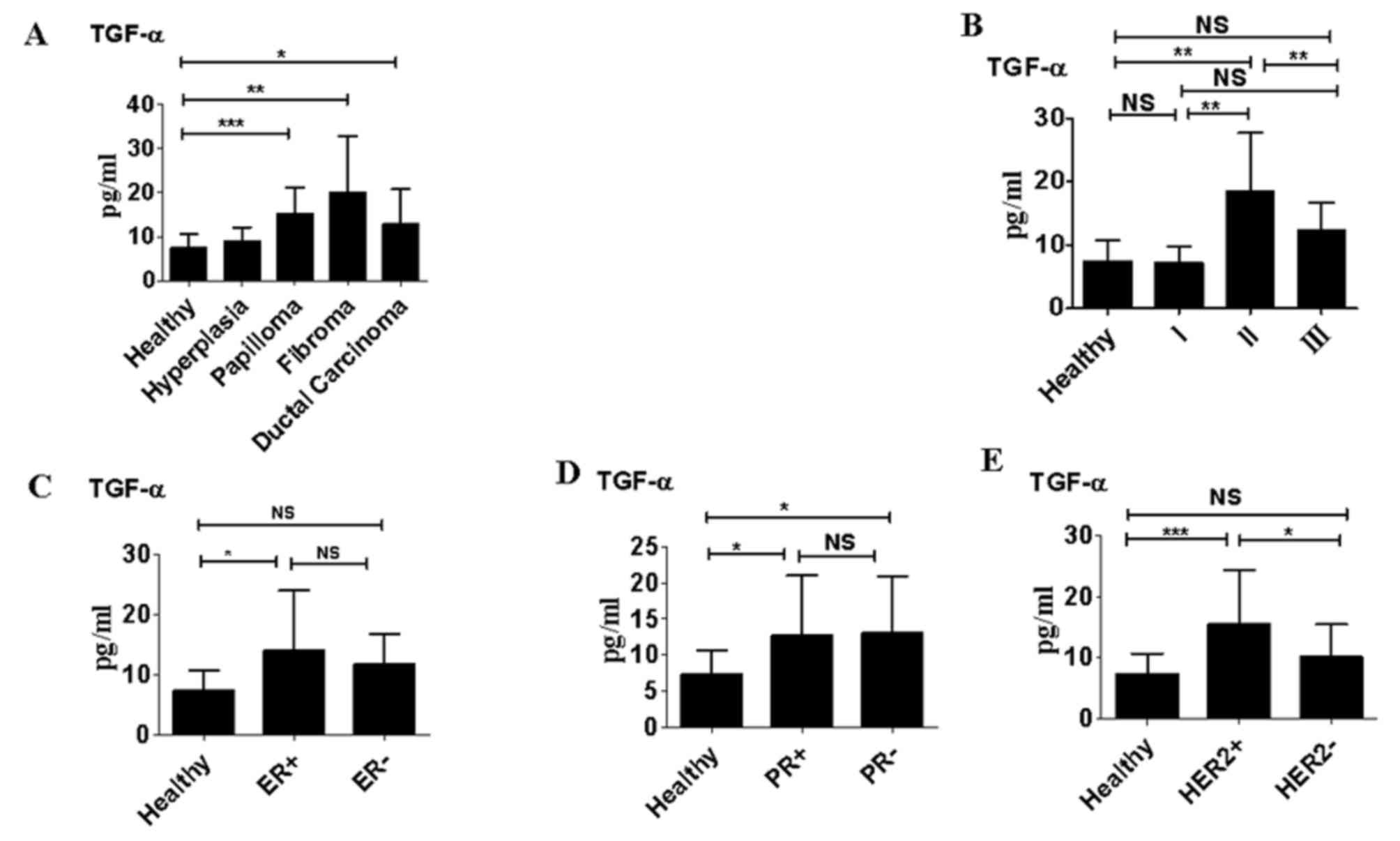|
1
|
Amin AL, Purdy AC, Mattingly JD, Kong AL
and Termuhlen PM: Benign breast disease. Surg Clin North Am.
93:299–308. 2013. View Article : Google Scholar : PubMed/NCBI
|
|
2
|
Jiang X and Shapiro DJ: The immune system
and inflammation in breast cancer. Mol Cell Endocrinol.
382:673–682. 2014. View Article : Google Scholar : PubMed/NCBI
|
|
3
|
McEvoy MP, Coopey SB, Mazzola E, Buckley
J, Belli A, Polubriaginof F, Merrill AL, Tang R, Garber JE, Smith
BL, et al: Breast cancer risk and follow-up recommendations for
young women diagnosed with atypical hyperplasia and Lobular
Carcinoma In Situ (LCIS). Ann Surg Oncol. 22:3346–3349. 2015.
View Article : Google Scholar : PubMed/NCBI
|
|
4
|
Standish LJ, Sweet ES, Novack J, Wenner
CA, Bridge C, Nelson A, Martzen M and Torkelson C: Breast cancer
and the immune system. J Soc Integr Oncol. 6:158–168.
2008.PubMed/NCBI
|
|
5
|
DeNardo DG and Coussens LM: Inflammation
and breast cancer. Balancing immune response: Crosstalk between
adaptive and innate immune cells during breast cancer progression.
Breast Cancer Res. 9:2122007. View
Article : Google Scholar : PubMed/NCBI
|
|
6
|
Robertson FM, Ross MS, Tober KL, Long BW
and Oberyszyn TM: Inhibition of pro-inflammatory cytokine gene
expression and papilloma growth during murine multistage
carcinogenesis by pentoxifylline. Carcinogenesis. 17:1719–1728.
1996. View Article : Google Scholar : PubMed/NCBI
|
|
7
|
Schmid BC, Rudas M, Rezniczek GA,
Leodolter S and Zeillinger R: CXCR4 is expressed in ductal
carcinoma in situ of the breast and in atypical ductal hyperplasia.
Breast Cancer Res Treat. 84:247–250. 2004. View Article : Google Scholar : PubMed/NCBI
|
|
8
|
Chin AR and Wang SE: Cytokines driving
breast cancer stemness. Mol Cell Endocrinol. 382:598–602. 2014.
View Article : Google Scholar : PubMed/NCBI
|
|
9
|
Cochaud S, Giustiniani J, Thomas C,
Laprevotte E, Garbar C, Savoye AM, Curé H, Mascaux C, Alberici G,
Bonnefoy N, et al: IL-17A is produced by breast cancer TILs and
promotes chemoresistance and proliferation through ERK1/2. Sci Rep.
3:34562013. View Article : Google Scholar : PubMed/NCBI
|
|
10
|
Booth BW and Smith GH: Roles of
transforming growth factor-alpha in mammary development and
disease. Growth Factors. 25:227–235. 2007. View Article : Google Scholar : PubMed/NCBI
|
|
11
|
Bastid J, Bonnefoy N, Eliaou JF and
Bensussan A: Lymphocyte-derived interleukin-17A adds another brick
in the wall of inflammation-induced breast carcinogenesis.
Oncoimmunology. 3:e282732014. View Article : Google Scholar : PubMed/NCBI
|
|
12
|
Chen WC, Lai YH, Chen HY, Guo HR, Su IJ
and Chen HH: Interleukin-17-producing cell infiltration in the
breast cancer tumour microenvironment is a poor prognostic factor.
Histopathology. 63:225–233. 2013. View Article : Google Scholar : PubMed/NCBI
|
|
13
|
Kornasiewicz O, Grąt M, Dudek K,
Lewandowski Z, Gorski Z, Zieniewicz K and Krawczyk M: Serum levels
of HGF, IL-6, and TGF-α after benign liver tumor resection. Adv Med
Sci. 60:173–177. 2015. View Article : Google Scholar : PubMed/NCBI
|
|
14
|
Hamidullah, Changkija B and Konwar R: Role
of interleukin-10 in breast cancer. Breast Cancer Res Treat.
133:11–21. 2012. View Article : Google Scholar : PubMed/NCBI
|
|
15
|
Mittal SK and Roche PA: Suppression of
antigen presentation by IL-10. Curr Opin Immunol. 34:22–27. 2015.
View Article : Google Scholar : PubMed/NCBI
|
|
16
|
Igietseme JU, Ananaba GA, Bolier J, Bowers
S, Moore T, Belay T, Eko FO, Lyn D and Black CM: Suppression of
endogenous IL-10 gene expression in dendritic cells enhances
antigen presentation for specific Th1 induction: Potential for
cellular vaccine development. J Immunol. 164:4212–4219. 2000.
View Article : Google Scholar : PubMed/NCBI
|
|
17
|
Kozlowski L, Zakrzewska I, Tokajuk P and
Wojtukiewicz MZ: Concentration of interleukin-6 (IL-6),
interleukin-8 (IL-8) and interleukin-10 (IL-10) in blood serum of
breast cancer patients. Rocz Akad Med Bialymst. 48:82–84.
2003.PubMed/NCBI
|
|
18
|
Esquivel-Velázquez M, Ostoa-Saloma P,
Palacios-Arreola MI, Nava-Castro KE, Castro JI and Morales-Montor
J: The role of cytokines in breast cancer development and
progression. J Interferon Cytokine Res. 35:1–16. 2015. View Article : Google Scholar : PubMed/NCBI
|
|
19
|
Ikeguchi M, Hatada T, Yamamoto M, Miyake
T, Matsunaga T, Fukumoto Y, Yamada Y, Fukuda K, Saito H and Tatebe
S: Serum interleukin-6 and −10 levels in patients with gastric
cancer. Gastric Cancer. 12:95–100. 2009. View Article : Google Scholar : PubMed/NCBI
|
|
20
|
Goldberg JE and Schwertfeger KL:
Proinflammatory cytokines in breast cancer: Mechanisms of action
and potential targets for therapeutics. Curr Drug Targets.
11:1133–1146. 2010. View Article : Google Scholar : PubMed/NCBI
|
|
21
|
Jarnicki AG, Lysaght J, Todryk S and Mills
KH: Suppression of antitumor immunity by IL-10 and
TGF-beta-producing T cells infiltrating the growing tumor:
Influence of tumor environment on the induction of CD4+ and CD8+
regulatory T cells. J Immunol. 177:896–904. 2006. View Article : Google Scholar : PubMed/NCBI
|
|
22
|
Zhang HZ, Li XH, Zhang X, Zhang ZY, Meng
YL, Xu SW, Zheng Y, Zhu ZL, Cui DS, Huang LX, et al: PINCH protein
expression in normal endometrium, atypical endometrial hyperplasia
and endometrioid endometrial carcinoma. Chemotherapy. 56:291–297.
2010. View Article : Google Scholar : PubMed/NCBI
|
|
23
|
Chavey C, Bibeau F, Gourgou-Bourgade S,
Burlinchon S, Boissière F, Laune D, Roques S and Lazennec G:
Oestrogen receptor negative breast cancers exhibit high cytokine
content. Breast Cancer Res. 9:R152007. View
Article : Google Scholar : PubMed/NCBI
|
|
24
|
Suzuki M, Matsushima-Nishiwaki R,
Kuroyanagi G, Suzuki N, Takamatsu R, Furui T, Yoshimi N, Kozawa O
and Morishige K: Regulation by heat shock protein 22 (HSPB8) of
transforming growth factor-α-induced ovary cancer cell migration.
Arch Biochem Biophys. 571:40–49. 2015. View Article : Google Scholar : PubMed/NCBI
|


















